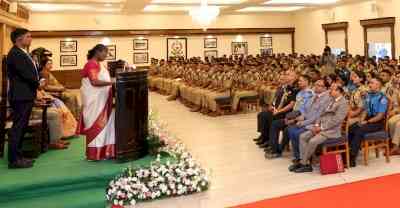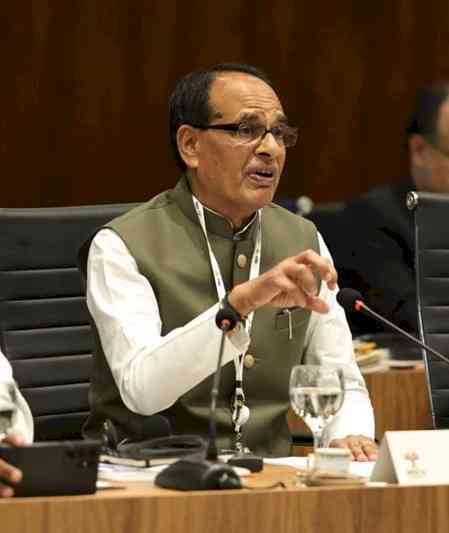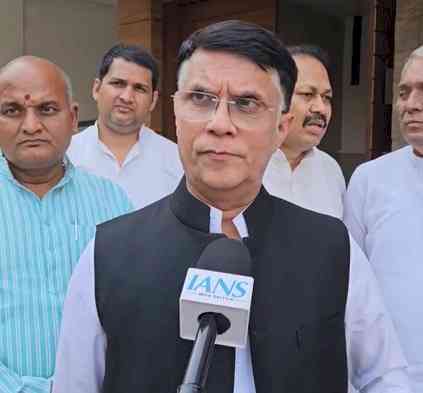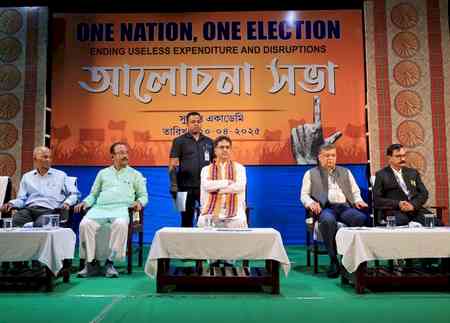Move from women empowerment to women-led development: President
Stating that larger participation of women results in better overall development, President Droupadi Murmu on Tuesday called for quickly moving ahead from the phase of empowering women to the stage of women-led development.

Hyderabad, Dec 27 (IANS) Stating that larger participation of women results in better overall development, President Droupadi Murmu on Tuesday called for quickly moving ahead from the phase of empowering women to the stage of women-led development.
"We should quickly move ahead from the phase of empowering women to the stage of women-led development. It is already happening in many fields. It must happen in a much bigger way," she said in her address to the probationers of the 74th batch of the Indian Police Service at the Sardar Vallabhbhai Patel National Police Academy, Hyderabad.
The President asserted that in line with "our stated national priorities, Nari Shakti has to play a major role in achieving the targets we have set for ourselves during the 'Amrit Kaal'".
"A truly 'Atmanirbhar Bharat' pre-supposes 'Atmanirbhar Nari'. It is very rightly said that when you invest in a woman, the woman invests in everyone else. It is heartening to note that women are demonstrating greater participation in our democratic process," she said.
Describing the rising share of women voters as one of the biggest achievements of Indian democracy in recent times, she noted that the leadership pipeline of women has to become larger and stronger in every walk of life.
The President also emphasised that women in leadership positions, like woman police officers, should always help other women, especially the vulnerable.
She was happy to note that gender related inputs are integrated into training modules of the IPS probationers. She said she was extremely delighted to know that for the last three successive batches of the IPS, woman officer trainees have been recognised as the best probationers.
The President observed that crimes against women remain a blot on our society. "Let us all resolve to bring about transformational changes. You have to ensure that a girl travelling alone at late hours feels safe. Everyone has to ensure that fellow citizens follow the fundamental duty of renouncing practices derogatory to the dignity of women as stated in our Constitution," she added.
She said that when the country is celebrating 'Azadi ka Amrit Mahotsav', the nation acknowledges the rich contribution of our police force in sustaining and strengthening the world's largest and most vibrant democracy. The Indian police has also made its huge contribution in preserving the unity of the country. Thousands of brave police personnel have laid down their lives for the cause of India's internal security. She paid her respects to the IPS officers who sacrificed their lives at the altar of duty.
Describing police as the most visible organ of the government, she observed that the police force commands trust of the people, it enhances the image of the government. The police would command respect and trust only when the entire force under them, to the last constable, displays alertness, sensitivity and honesty. She said that right since the beginning of their career, IPS probationers would be in leadership positions. The quality of their leadership would determine the effectiveness and morale of the force led by them. She advised them to keep in mind and demonstrate through action the five fundamental attributes of integrity, impartiality, courage, competence and sensitivity.
The President said that police forces have to be partners in the progress of the country and transformation of the society. Police officers are going to play the roles of change-agents in India's achieving greater prosperity while ensuring sustainable development, especially inclusion. "Inclusion means - inclusion of that last person, the most deprived person, the most vulnerable person. That person should be at the centre of their concerns."
She advised them to be sensitive to the plight of the voiceless. She said that Police officers have to ensure that an illiterate poor man living in a remote corner of the country gets sympathetic support at the local police post. The criminals should tremble with fear at the very thought of the police. But, at the same time, the common citizen should look at the police as a friend and saviour.


 IANS
IANS 










